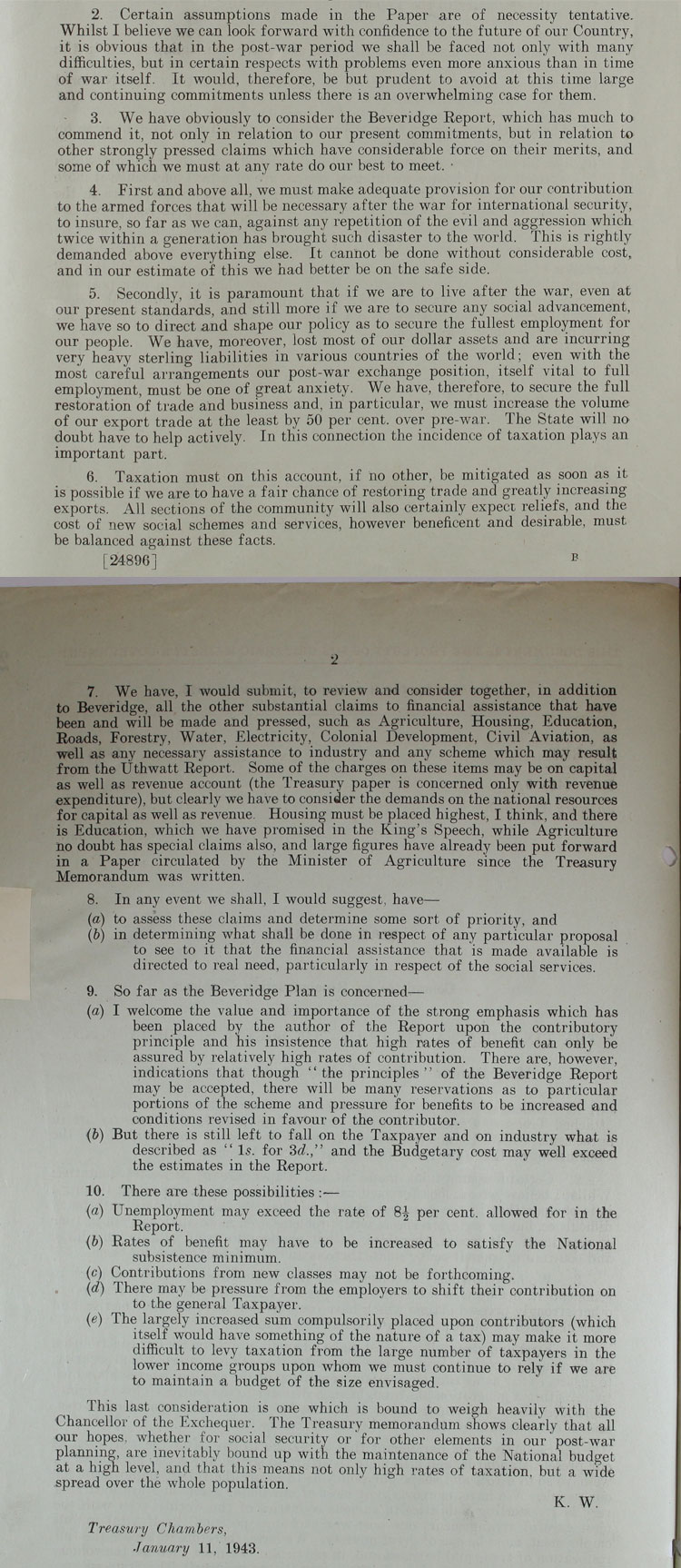
Memorandum from the Conservative Chancellor of the Exchequer, Kingsley Wood on the financial aspects of the social security plan, 11 January, 1943 (CAB 65/33)
2. Certain assumptions made in the Paper are of necessity tentative. Whilst I believe we can look forward with confidence to the future of our Country, it is obvious in the post-war period we shall be faced not only with many difficulties, but in certain respects with problems even more anxious than in time of war itself. It would, therefore, be but prudent to avoid at this time large and continuing commitments unless there is an overwhelming case for them.
3. We have obviously to consider the Beveridge Report, which has much to commend it, not only in relation to our present commitments, but in relation to other strongly pressed claims which have considerable force on their merits, and some of which we must at any rate do our best to meet.
4. First and above all, we must make adequate provision for our contribution to the armed forces that will be necessary after the war for international security to insure, so far as we can, against any repetition of the evil and aggression which twice within a generation has brought such disaster to the world. This is rightly demanded above everything else. It cannot be done without considerable cost, and in our estimate of this we had better be on the safe side.
5. Secondly, it is paramount that if we are to live after the war, even at our present standards, and still more if we are to secure any social advancement, we have so to direct and shape our policy as to secure the fullest employment for our people. We have, moreover, lost most of our dollar assets and are incurring very heavy sterling liabilities in various countries of the world, even with the most careful arrangements our post-war world exchange position, itself vital to full employment, must be one of great anxiety. We have, therefore, to secure the full restoration of trade and business and, in particular, we must increase the volume of our export trade at the very least by 50 per cent over the pre-war. The state will no doubt have to help actively. In this connection the incidence of taxation plays an important part.
6. Taxation must on this account, if no other, be mitigated as soon as it is possible if we are to have a fair chance of restoring trade and greatly increasing exports. All sections of the community will also certainly expect reliefs, and the cost of new social schemes and services, however beneficent and desirable, must be balanced against these facts.
7. We have, I would submit, to review and consider together, in addition to Beveridge, all the other substantial claims to financial assistance that have been and will be made and pressed, such as Agriculture, Housing, Education, Roads, Forestry, Water, Electricity, Colonial Development, Civil Aviation, as well as any necessary assistance to industry and any scheme which may result from the Uthwatt Report. Some of the charges on these items may be on capital as well as revenue account (the Treasury paper is concerned only with revenue expenditure) but clearly we have to consider the demands on the national resources for capital as well as revenue. Housing must be placed highest, I think, and there is Education which we have promised in the King’s Speech, while Agriculture no doubt has special claims also, and large figures have already been put forward in a Paper circulated by the Minister of Agriculture since the Treasury Memorandum was written.
8. In any event we shall, I would suggest, have—
a) to assess these claims and determine some sort of priority and
b) in determining what shall be done in respect of any particular proposal to see to it that the financial assistance that is made available is directed to real need, particularly in respect of the social services.
9. So far as the Beveridge Plan is concerned—
a) I welcome the value and importance of the strong emphasis which has been placed by the author of the Report upon the contributory principle and his insistence that high rates of benefit can only be assured by relatively high rates of contribution. There are, however, indications that though “the principles” of the Beveridge Report may be accepted, there will be many reservations as to particular portions of the scheme and pressure for benefits to be increased and conditions revised in favour of the contributor.
b) But there is still left to fall on the Taxpayer and on industry what is described as “1s for 3d”, and the Budgetary cost may well exceed the estimates in the Report.
10. There are these possibilities:—
a) Unemployment may exceed the rate of 8½ per cent allowed for in the Report.
b) Rates of benefit may have to be increased to satisfy the National subsistence minimum.
c) Contributions from new classes may not be forthcoming.
d) There may be pressure from the employers to shift their contribution on to the general Taxpayer.
e) The largely increased sum compulsorily placed upon contributors (which itself would have something of the nature of a tax) may make it more difficult to levy taxation from the large number of taxpayers in the lower income groups upon whom we must continue to rely if we are to maintain a budget of the size envisaged.
This last consideration is one which is bound to weigh heavily with the Chancellor of the Exchequer. The Treasury memorandum shows clearly that all our hopes whether for social security or for other elements in our post-war planning, are inevitably bound up with the maintenance of the National budget at a high level, and that this means not only high rates of taxation, but a wide spread over the whole population.
K.W. [Kingsley Wood]
Treasury Chambers
11th January 1943
